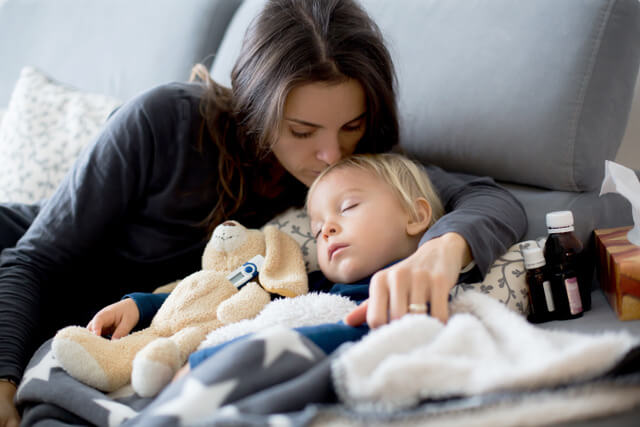At LittleGuide Detroit, we want to make life easier for parents – which often times includes sharing cool new destinations, but also information about the best resources for your family as well – including the best pediatric hospital. During these challenging times, parents are struggling to figure out if kids are sick and what should they do about it. To get answers to common COVID questions, Kerry and Carrie sat down with Children’s Hospital of Michigan’s pediatrician Dr. Tiffney Widner for LittleGuide LIVE. Watch the clip below and check out the Q&A.
What are some of the most frequently reported symptoms of the flu and COVID-19 to look for?
Both COVID-19 and the flu can have varying degrees of signs and symptoms, ranging from no symptoms or asymptomatic, to severe symptoms. Common symptoms that both COVID-19 and the flu share include:
- Fever or chills
- Cough
- Shortness of breath or difficulty breathing
- Fatigue
- Sore throat
- Runny or stuffy nose
- Muscle pain or body aches
- Headache
- And finally, Loss of taste or smell; although this last symptom is more frequent with COVID-19 but may occur with the flu as well
Typically with the flu, a child can experience symptoms anywhere from 1 to 4 days after infection. COVID-19 symptoms in children start about 5 days after being infected but can be present as soon as 2 days after exposure or as long as 14 days after exposure.
When should I seek medical attention for my child that has flu or COVID-19 like symptoms?
Because some of the symptoms of the flu and COVID-19 are similar, the difference between them cannot be made based on symptoms alone. Seeking a test to confirm a diagnosis is recommended to tell what the illness is and determine a treatment plan if necessary.
If your child is experiencing severe symptoms, such as a worsening fever, chest or muscle pain, confusion or the inability to stay awake, seek emergency care immediately.
How can I protect myself and my family against both COVID and the flu?
- Avoid close contact with people who are sick.
- Keep a distance of about 6 feet when in public spaces.
- Wash your hands often with soap and water for at least 20 seconds especially after you have been in a public place, or after blowing your nose, coughing, or sneezing.
- If soap and water are not readily available, use a hand sanitizer that contains at least 60% alcohol.
- Avoid touching your eyes, nose, and mouth with unwashed hands.
- Cover your mouth and nose with a tissue when you cough or sneeze or use the inside of your elbow. Throw used tissues in the trash.
- Clean AND disinfect frequently touched surfaces. This includes tables, doorknobs, light switches, countertops, handles, desks, phones, keyboards, toilets, faucets and sinks.
Is it safe to go to the hospital?
Children’s Hospital of Michigan takes every precaution possible to provide a safe environment for any emergency as well as for elective and medically necessary procedures as prescribed by your primary care physician or specialist. The hospital has implemented COVID SAFETY standards at all of our facilities, which are a combination of rigorous infection prevention processes, staff training, testing and utilization of personal protective equipment and technology focused on protecting patients and their families as they seek care at our facilities.
Are the flu and COVID vaccines safe for my child? What’s the difference?
Yes. The flu and the COVID-19 cause similar common symptoms. The flu vaccine significantly reduces the risk of dying of the flu. Research shows this is true for both children with an underlying medical condition and children who are healthy. Flu vaccination could reduce symptoms that might be confused with those caused by COVID-19. Preventing the flu and reducing the severity of flu illness and hospitalizations could also lessen the stress on the health care system. The flu vaccine also doesn’t protect your child from getting COVID-19.
The COVID vaccine helps prevent kids from getting COVID-19. Although COVID-19 in children is sometimes milder than in adults, some kids infected with the coronavirus can get severe lung infections, become very sick and require hospitalization. This is especially important to remember in light of the delta variant, which is more contagious than other coronavirus variants.
- The vaccine helps prevent or reduce the spread of COVID-19
- Getting vaccinated for COVID-19 can help stop other variants from emerging
- Having your child vaccinated for COVID can help restore a more normal life
- COVID-19 vaccines help protect the community
To learn more about Children’s Hospital of Michigan, or to make an appointment for a vaccine you can visit their website.








